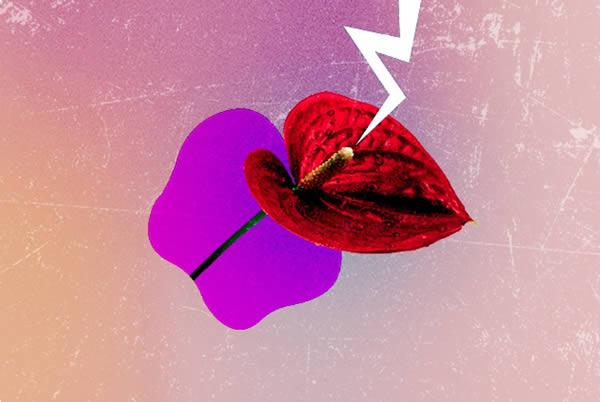Heather Jeffcoat, DPT
Answers to the Age Old Question "Why does My Clitoris Hurt?"
Anatomically speaking, the clitoris can be seen as the focal point of female genitalia. Most people are aware that it receives stimulation near the top center of the vaginal opening, but it also has legs (also known as "crura") made of erectile tissue that form a V-shape inside the body. Because of its scope and the high concentration of nerves it contains, it can receive stimulation in many ways, including externally at the vulve and deeper up in the vagina.
Combine this with the many other possible factors outlined below, and finding a solution to clitoral pain or discomfort can take a fair bit of research and reflection. These factors could include:
- Any number of potential health related issues
- Dietary problems and/or dehyration
- Where you are at in your cycle
- Perhaps most importantly, finding just what kind of stimulation works best for you and your anatomy
That said, here are two examples of some things to try from an excellent article on our blog entitled "New Year’s Resolutions for your Pelvic Floor | Do You Know Your Parts?":
- Perform a monthly self exam of your genitalia with a mirror and notice what’s your normal: color, size of structures, color of your secretions, smell, tissue texture, etc. Use your eyes to look and also your fingers to touch the different structures and become acquainted.
- By giving yourself regular self-exams, you can be better aware of changes and be able to get support from your healthcare team sooner when things arise.
The blog post linked above is not very long, but quite informative! I suggest taking a quick look if you haven't read it already, and when you're ready come right back here.
As the article at Giddy states, "The clitoris is the only organ in the human body exclusively for pleasure. Unfortunately, it can also become a source of discomfort and pain for some women. Pain in the clitoris can happen for many reasons, here are nine of the most common." So here we go:
9 Types of clitoral conditions
Various disorders directly or indirectly affect the vulvovaginal area, including the clitoris. The following list is not comprehensive but covers some of the most prevalent health conditions that cause discomfort, irritation or pain in the clitoris.
1. Clitorodynia
Clitorodynia, or pain in the clitoris, is technically a symptom, not a disorder. But it is one of the most common reasons patients seek help from her practice, said Heather Jeffcoat, D.P.T., president of the Academy of Pelvic Health Physical Therapy and owner of Femina Physical Therapy in California. It is a subtype of vulvodynia (vulvar pain), she explained.
2. Clitoral atrophy
Clitoral atrophy indicates a clitoris that's shrunk in size, said Michael Krychman, M.D., an OB-GYN at HerMD in California. Orgasm intensity and the ability to become aroused are lost or diminished.
3. Clitoromelagy
Clitoromegaly is an unusually large clitoris. Although the clitoris naturally swells during arousal, it resumes its usual size when the arousal state is over. In people with clitoromegaly, the clitoris remains enlarged for reasons unrelated to sexual arousal or stimulation.
4. Vulvar dermatitis
An allergic reaction, or vulvar dermatitis, which affects the skin of the vulvovaginal area, isn’t uncommon. Seventy percent of women experience itching. Other symptoms include irritation and soreness.
5. Vaginal infections
Infections affecting the vulva and vagina frequently impact the clitoris, Lee and Krychman said. The most prevalent of these are candidiasis (yeast infections) and bacterial vaginosis. If you are sexually active, you’ll need to pass on sex until after you’ve treated your yeast infection. It can be passed to your partner.
These uncomfortable infections aren't classified as STIs. Chlamydia, gonorrhea, herpes, syphilis and urinary tract infections can affect the clitoris as well.
Common symptoms include:
- Pain
- Burning
- Itching
- Discharge
- Redness
- Discomfort during intercourse
The list of things to avoid is long: soaps, inserting a tampon, or using other perfumed feminine hygiene products. Skip over any products using colors, flavoring or other artificial additives.
6. Clitoral adhesions
Clitoral adhesions are when the preputial skin adheres to the glans clitoris, Krychman said. One common iteration is clitoral phimosis, an anatomical condition in which the hood of the clitoris is too tight or there is no opening for the clitoris glans to protrude.
7. Autoimmunity
Lichen sclerosus and lichen planus are inflammatory dermatological conditions of the vulva. Lichen sclerosus can cause a host of symptoms, including severe inflammation, scarring, fibrosis or adhesions in the vulvovaginal area.
8. Nerve damage
Pudendal neuralgia or damage to the pudendal nerve, a major pelvic nerve, most often occurs due to childbirth or gynecological surgery. Strenuous physical activities such as hard bike riding or weightlifting can cause damage. This condition may arise from lumbar disc prolapse or spinal stenosis. Physicians don’t always know the cause.
9. Vulvar intraepithelial neoplasia (VIN)
Abnormal tissue development, or vulvar intraepithelial neoplasia, appears on external genitalia, such as the clitoris and surrounding area. Typically, it's caused by human papillomavirus (HPV) and may appear alongside genital warts. Some people with VIN experience no symptoms, while others experience itching, soreness and painful sex, Lee said.
The bottom line
When you experience pain in your clitoris, you don’t have to grit your teeth and bear it. Speak with a healthcare professional for the correct diagnosis. Some treatment options may be as simple as visiting a physical therapist or changing the type of feminine hygiene products you use.
There is a lot more to the question "Why does my clitoris hurt?" in the full article at the Giddy website, as well as our own archive of articles that cover the clitoris here.










